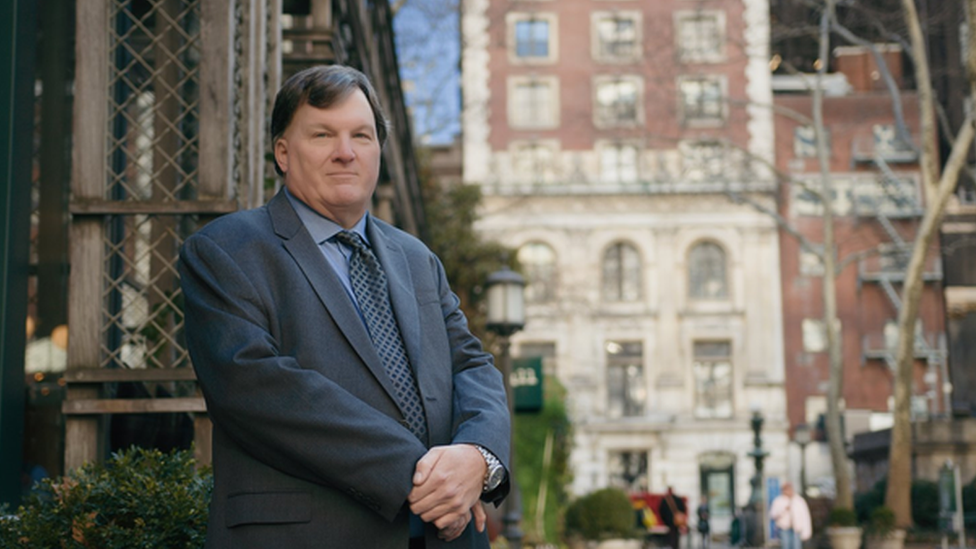Gilgo Beach murders police search Amityville storage unit
- Published

Victims Megan Waterman (L), Amber Costello (centre) and Melissa Barthelemy (R)
Detectives investigating a series of cold-case murders in Long Island are searching a storage unit following the arrest of a suspect last week.
Rex Heuermann, 59, pleaded not guilty after being charged with the killings of Megan Waterman, Amber Costello and Melissa Barthelemy.
The prosecutor in the case says he expects to charge the suspect, an architect, with a fourth murder.
The bodies were found close together by detectives in Gilgo Beach in 2010.
In total, the remains of 10 adults and a toddler were discovered on a stretch of sand on South Shore in Long Island, close to New York City, within weeks of one another.
Local police told the New York Post officers executed a search warrant at a single storage lock-up located at Omega Self Storage in Amityville "in relation to the Gilgo suspect case".
Meanwhile, District Attorney Ray Tierney said he was "confident" about a charge in a fourth murder, of Maureen Brainard-Barnes, saying Mr Heuermann's alleged acts "were the worst I've ever seen".
Mr Heuermann, an architect and married father from Long Island, is facing three counts of first-degree murder and three counts of second-degree murder in the three women's deaths. He is also suspected in the death of Ms Brainard-Barnes.
The women, dubbed the Gilgo Four, were among the 11 sets of human remains found in total along the sandy stretch after police went searching for another missing woman, Shannan Gilbert in 2010.
Ms Gilbert's remains were eventually found and an official post-mortem examination was inconclusive. The investigation into the other potential victims is ongoing.

Rex Heuermann is an architect who has worked in Manhattan since 1987
The judge in Mr Heuerman's case ordered that he remain in custody for the "extreme depravity" of the case.
At a news conference on Friday, Mr Tierney said "each of the four victims were found similarly positioned, bound in a similar fashion by either belts or tape, with three of the victims found wrapped in a burlap-type material".
Prior to last week's stunning arrest, the investigation into what happened to the Gilgo Four had been cold for over a decade.
The initial investigation has faced serious criticism, including claims that authorities did not take the murders as seriously because the women were sex workers at the time they disappeared.
Last week, Mr Tierney said the case against Mr Heuermann was ultimately built out of mobile phone records linking him to the victims as well as DNA evidence, after investigators took a sample from a pizza box he discarded in a rubbish bin in Manhattan in 2023.
Mr Heuermann was continuing to seek out sex workers up until his arrest last week, Mr Tierney said, even as officers placed him under observation.
"This individual was a person that continued to patronize sex workers at all hours of the night," Mr Tierney said. "He continued to use fictitious email addresses, fictitious identities, burner phones."
The arrest of Mr Heuermann, the owner of a Manhattan architecture firm that describes itself as "New York's premier architectural firm", shocked his neighbours and the architecture profession in New York.
On Sunday, a woman who met the suspect through a networking group for architects and designers shared a voicemail from Mr Heueurmann with ABC-7 Eyewitness News, external.
Dominique Vidal, who said Mr Heuermann left her the message in late February after she left the group, assumed it was a friendly attempt to connect professionally.
But Ms Vidal also recalled past conversations with Mr Heuermann, in which he asked her if she knew about the Gilgo Beach murders.
"And back then I will say 'Oh you know, he's just from the area, maybe you know, he's just a local talking about and would think that I'd find it interesting,'" she said. But now, she added, "I see it as a serial killer".
Related topics
- Published15 July 2023

- Published7 April 2011